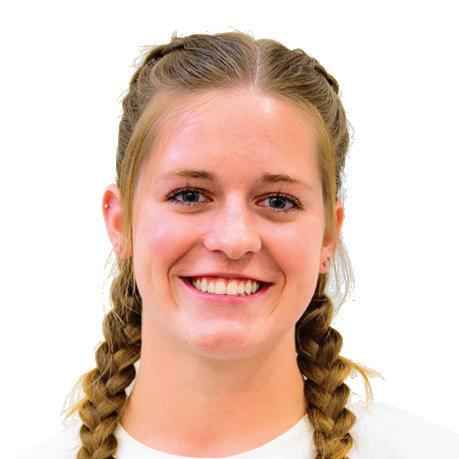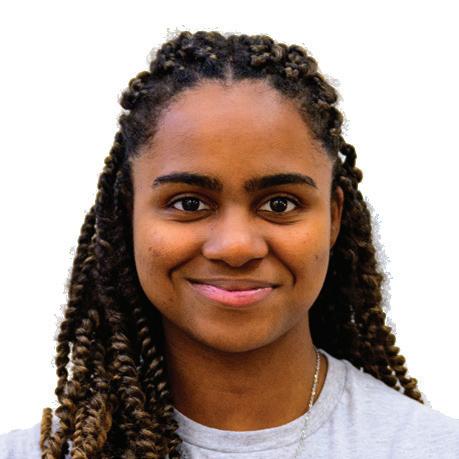












At Target, a display for the Stanley Valentine’s Day cup collection is swarmed by shoppers, some walking away with three or four of the same cup in hand. The display is sold out in four minutes. Scroll.
The viral TikTok jumpsuit. Run, don’t walk. Scroll.
A woman lies in bed with the viral face-slimming strap. She has it linked below. Buy now. Scroll.
The viral TikTok jumpsuit, but in brown. Scroll.
Themes of overconsumption are visible every day, especially on social media. Some purchased goods, like clothes, are used once or not at all before being thrown out.
“You’ve got issues of planned obsolescence, where clothes may not be made very well so that they fall apart quickly,” said Kevin Smiley, an assistant professor in LSU’s sociology department. “Which, of course, makes you buy more.”
Microbiology sophomore Lillian Lemann generally donates her clothes once she’s done with them, but she’s gotten pieces from fast fashion company Shein for game days that she didn’t donate because of their condition.
“I just throw them away because the quality isn’t suitable,” Lemann said.
Fashion sophomore Martha Rigney compared the quality of some fast fashion brands to that of a paper dress popularized in the 1960s. Created as an easy way to try out bold prints without the fuss of alterations, large companies began to use the dresses as artistic advertisements. Even Richard Nixon’s 1968 presidential campaign commissioned a paper dress design. These dresses were designed to be worn once or twice and then disposed of.
“Shein is essentially just making disposable clothing, but fashion is not supposed to be like that,” Rigney said. “Fashion is the outward way of communicating who you are to other people visually. It really shows people what kind of subculture you associate yourself with.”
The effect of a social mediadriven marketplace is sometimes referred to by researchers as attention deficit fashion. Microtrends are a manifestation of this phenomenon; these are fashion trends that briefly surge in popularity before disappearing into obscurity. Some examples of microtrend aesthetics include coastal granddaughter, quiet luxury, vintage Americana, office siren and, more recently, the mob wife aesthetic.
“Now, everybody is wearing
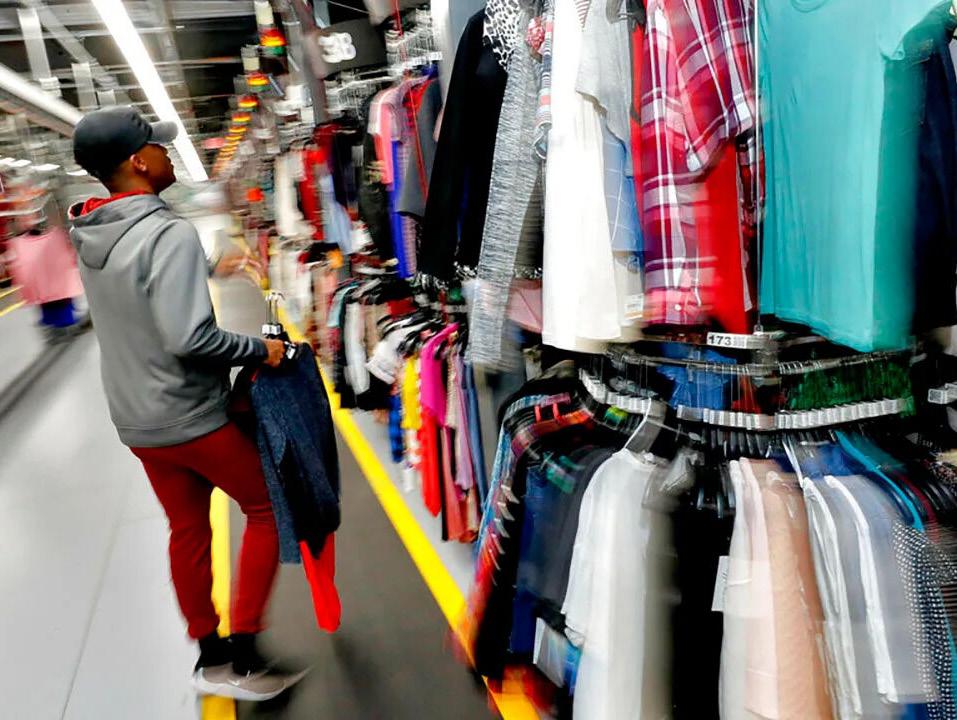
the same thing. It takes some individuality out of it,” Rigney said. “It really pressures you to follow whatever is trending at that time rather than being able to put together pieces that represent you.”
The motives for consumption aren’t always just about utility, either. It’s a social process, Smiley said.
“People often want to position themselves in terms of their status in addition to class,” he said. “It’s indicating that you’re a member of the group, that you should be recognized in a certain way for having these products available to you.”
Michael Mamp, a professor and the director of the LSU Textile and Costume Museum, said, especially in America, “our identity is linked to what we own and how much of it we own.”
The pack mentality is real, according to Joshua Howard, who teaches a social media and digital branding class at the LSU Manship School of Mass Communication.
“As much as we love and crave individuality, we crave community more,” Howard said, “and consumerism gives us an opportunity to find a community and put on a hat whether it’s authentic to us or not.”
According to Howard, online shopping allows an immersion into that experience.
Rigney also noted online shopping requires less deliberation than in-person purchasing.
Transactions are only a click
away, so consumers wind up purchasing items they might not have bought in-person.
“You can’t just go on social media for mindless entertainment anymore,” Rigney said. “You’re constantly being sold something.”
Howard said another factor in overconsumption patterns is the scarcity mindset. When the word “viral” is attached to a product, it automatically introduces the idea that everyone is getting it and it will sell out. Consumers fear scarcity and will buy the product, making “viral” a self-fulfilling prediction.
An example of the scarcity mindset Louisiana sees nearly every year is the wipe-out of necessities during hurricane season. If no one acted out of fear of missing out, then shelves wouldn’t be empty. However, because people believe this will be their last chance, it can become a Herculean feat to find toilet paper during a hurricane warning.
In relation to “viral” products or trending items, Howard said there comes “a kind of FOMO,” a fear of missing out. His solution? Think more about what is being marketed, and that it’s curated to specific consumers.
“Really it comes down to greater self-regulation and better self-leadership, which is hard,” Howard said. “Leading yourself well in a healthy state, whatever healthy looks like for you, is so incredibly challenging.”
Fashion senior Hannah Bi-
envenu has recovered hundreds of pounds of textiles left in the dumpsters at the end of the school year outside residential halls at LSU. She runs a resale business and can repurpose pieces, but she said many “still have tags on them or are still in the envelope it was shipped in.”
Bienvenu suggested hosting a swap event with groups instead of throwing out pieces or donating, as 84% of clothing donations wind up in landfills, according to the U.S. Environmental Protection Agency.
“There’s constantly going to be advancement,” Howard said, “but the tactics, the techniques, the persuasion, the psychology around it will remain the same. But oftentimes people forget that and they think that this is brand new and it’s never happened before. But then you take a step back and you realize, no, this has happened before.”
The eventual end of the paper dress trend in the 1960s came with the introduction of hippie culture and the mood shift to an overall disapproval of frivolous consumption. Socially, mindsets began to change, and, by consequence, the production market had to follow the consumers.
With the comparison of the disposable products of our past and our present, it isn’t unrealistic to hope for a future in which buyers are more intentional with their purchases.
“It’s important to realize that as things advance, nothing really changes,” Howard said.
A state supreme court ruling and subsequent legislation in Alabama recently brought reproductive rights into the public eye.
The Alabama Supreme Court ruled Feb. 16 that frozen embryos had the same rights and protections as children, a decision that led fertility clinics in the state to stop their in vitro fertilization practices.
IVF is an alternative form of conception typically used by women who have had difficulty becoming pregnant. The process involves collecting eggs from the ovaries and manually fertilizing them in a lab. The result is a number of extrauterine embryos, which can either be frozen for storage or used to begin a pregnancy.
Alabama’s Legislature reacted to the court’s IVF ruling by passing a law giving providers and patients immunity from civil and criminal repercussions.
The law didn’t, however, change the new legal status of frozen embryos in the state; they’re still considered children under the court’s ruling.
Following the immunity law, some of Alabama’s fertility clinics planned to reopen, but the clinic involved in the initial case made a public announcement saying they would remain closed.
“At this time, we believe the law falls short of addressing the fertilized eggs currently stored across the state and leaves challenges for
physicians and fertility clinics trying to help deserving families have children of their own,” a spokesperson for the Mobile Infirmary Health and the Center for Reproductive Medicine said.
In Louisiana, reproductive rights have become an increasingly embattled issue since the state made most abortions illegal following the U.S. Supreme Court’s historic Roe v. Wade reversal in 2022.
At LSU, the student organization Feminists in Action is a major advocate for the issue on campus.
The group’s director of political awareness, psychology junior Catherine Sutton, said she saw Alabama’s recent immunity law as a “band-aid.”
Sutton said the “quick fix” didn’t resolve the initial ruling’s problematic implications, regarding fetal personhood, and that although some fertility clinics would reopen, the damage had already been done.
“It leaves IVF providers still very vulnerable to any changes that they might have,” Sutton said.
Interpretation of the law has also become an issue in Louisiana.
Since the U.S. Supreme Court reversed the country’s long-held constitutional-rights stance on abortion, a spate of new laws throughout the states have criminalized or placed limits on the procedure.
Louisiana’s abortion law makes exceptions for “good faith medical judgment” to prevent the death of a pregnant woman, but the statute’s vague wording means most doc-
tors won’t risk the potential legal repercussions of intervening in a pregnancy.
Nancy Davis, a Baton Rouge native, knew this struggle personally.
Davis was told in August 2022 that the fetus she was carrying had acrania, a diagnosis that meant the fetus was growing without a skull and most of the brain. Her doctor told her that even if the fetus made it through birth, he or she would die in minutes.
Louisiana reproductive laws, despite having exceptions for nonviable pregnancies, were so vague that doctors feared prosecutions and losing their licenses, Davis said. Although the fetus she was carrying was nonviable, Davis couldn’t get the healthcare she needed in Louisiana.
She had two choices: carry to term or drive across the country to a state where abortion was legal.
Davis reached out to local news to share her story.
“I knew if I was going through it,” Davis said, “...other women, other families were going through it as well.”
Davis traveled 1,500 miles to get an abortion in New York. Afterward, she started the Nancy Davis Foundation which she said revolves around advocating for reproductive justice and maternal health, as well as bridging gaps in healthcare access.
“From that moment, I made a conscious decision,” Davis said, “and I always felt obligated and a sense of responsibility to help as
many others as I possibly could.”
Alabama’s recent IVF case was brought to court by three couples whose frozen embryos were accidentally destroyed at a fertility clinic. They sought damages under the state’s Wrongful Death of a Minor Act, which allows parents of a deceased child to seek punitive damages within six months of the child’s death if it was caused by “the wrongful act, omission, or negligence of any person.”
The all-Republican court ruled 8-1 that any unborn child, regardless of developmental stage or location inside or outside the womb, is considered a child under the Wrongful Death Act, opening the possibility of criminal prosecution for fertility doctors.
Within days of the ruling designed to protect “extrauterine children,” major fertility clinics in Alabama closed its IVF services, driving up the cost of IVF for families forced to go out of state. And IVF already costs, on average, around $25,000.
Shortly after, U.S. Sen. Tammy Duckworth, D-Illinois, who had two children through IVF, proposed a bill that would protect the medical practice on a national level. The bill was swiftly shot down.
Since Alabama’s ruling, even more states, like Iowa, Kentucky and Utah, have introduced legislation with fetal personhood language.
Alabama’s legislature respond-
LSU Student Government is working to bring a virtual option for Tiger Cards to campus.
On March 27, the LSU Student Senate passed SGR 17, creating the possibility for a virtual Tiger Card. If implemented by the LSU administration, students would still receive their first Tiger Card for free, but could also use the virtual card as a supplement to or instead of the plastic card. The virtual Tiger Card would allow students to access buildings and pay with Paw Points and Tiger Cash, just like the current Tiger Cards.
“It’s a really great initiative because we do recognize this growing want for better accessibility to these types of things on campus, so it’s definitely great to have this,” said Jahbari Parquet, SG’s director of veteran and military affairs.
The virtual Tiger Card would be accessible through an app, such as the LSU mobile app. SG leaders are also hoping to allow students to add the card to their phone wallet, like Apple or Google wallets. Colleges like Duke, Temple and Johns Hopkins have been working with Apple to
LSU petroleum engineering associate professor Mehdi Zeidouni has been awarded a $252,160 grant from the LSU Institute for Energy Innovation.
The grant will support his work tracking subsurface carbon dioxide flow and well-sealing capacity in geological carbon storage projects.
Louisiana is among the most carbon-intensive states in the nation, emitting over 200 million tons of carbon dioxide annually. This high level of emission is largely due to the state’s reliance on carbon-intensive industries such as oil and gas production, refining and chemical manufacturing.
As a result, Louisiana is uniquely positioned to benefit from carbon capture and storage technologies, which can help reduce the carbon footprint of these industries and contribute to the state’s efforts in decarbonization and cli-

mate change mitigation.
“The oil and gas industry is a major industry in Louisiana and for Louisiana’s economy. CO2 capture and storage is the only method that allows the continued use of fossil fuels while reducing their carbon footprint,” Zeidouni said.
“This will allow us to have an energy transition in the state, and it’ll make sure that there are no significant economic or social or political consequences for the state.”
CCS has the potential to facilitate a smooth transition to cleaner
energy sources in Louisiana, minimizing negative impacts on the state’s economy, society and political landscape, supporters say. Some residents and environmentalists, however, have raised concerns CCS isn’t safe and doesn’t address the root cause of high emissions.
“[Louisiana has] very amenable geology that allows for the effective storage of millions of tonnes of CO2 annually,” Zeidouni said.
According to Zeidouni, when carbon dioxide is captured, it is
typically stored underground at a depth of no less than 3,000 feet. This is because carbon dioxide at a shallow depth remains in a gaseous state.
Once the carbon dioxide is stored underground, it remains there secure and locked away. However, researchers are exploring the possibility of its use for future generations.
“The primary goal is to eliminate CO2 from the atmosphere. But we may want to use it as a product in later years, so we’re also interested in its long-term recoverability,” Zeidouni said. “We may want to use it as in later years, we may come up with a new technology that can use the CO2 effectively as a product so that we can make something with it.”
Ensuring that carbon dioxide is contained and retained in the subsurface allows for the possibility of recovering and reusing it, while highlighting the importance of long-term planning and research in carbon capture and storage ef-
forts.
Zeidouni’s research will introduce new methods to acquire and analyze pressure and temperature data. It will enable a quantitative estimation of critical parameters such as the lateral and vertical extent of carbon dioxide plumes, injection profiles and the migration of carbon dioxide upwells.
The grant will also support Zeidouni’s research by funding research assistants, including three master’s and two doctoral students, while also helping to establish industry partnerships.
The innovative approach has garnered support from four research partners: Advanced Resources International, Carbonvert, chemical company BASF and the Gulf Coast Carbon Center at the Bureau of Economic Geology. Through collaboration with these partners, Zeidouni plans to implement his proposed monitoring approaches in a practical and cost-effective manner, contributing to the advancement of CCS technologies.
IVF, from page 3
ed to its Supreme Court’s decision by drafting an immunity law for doctors and patients to pursue IVF. As a bill, it passed quickly through the state congress and was signed into law March 6.
The legislature didn’t define if an embryo created through IVF should be considered a child in Alabama law, but instead provided civil and criminal immunity to health providers and personnel in the case of death or destruction of an embryo.
The Alabama IVF ruling also drew attention because of the court’s religious rationale.
Chief Justice Tom Parker cited theology and scripture several times in his ruling opinion.
“(1) God made every person in His image; (2) each person there -
TIGER
, from page 3
implement a digital identification process, and Parquet hopes LSU will have that option, too.
The virtual card would also allow students to update their name and preferred pronouns, an issue SG’s LGBTQ+ Caucus of which Parquet is a member advocates for. Annie Sheehan-Dean, the chair of the caucus, said how virtual Tiger Cards will improve student experiences by creating a more inclusive campus.
fore has a value that far exceeds the ability of human beings to calculate;” Parker wrote, “and (3) human life cannot be wrongfully destroyed without incurring the wrath of a holy God, who views the destruction of His image as an affront to Himself.”
Alena Allen, dean of the LSU Paul M. Hebert Law Center, said she was shocked by the case.
Religious law is the influence of theocracy on legislation and interpretation of the law, she explained, and while the founding fathers made a clear distinction between church and state, “a large segment of Americans [are now] advocating for more dominance of religion into policy and law.”
Allen said that healthcare in the U.S. is being affected by a lobby that has nothing to do with health, what she described as the “religious
“Having a preferred name and pronouns and the ability to update those is super, super important on our Tiger Cards,” Sheehan-Dean said. “Tiger Cards are one of the primary methods of identification around campus, so I think it is important to having an inclusive and welcoming environment that we provide the most inclusive means of identifying individuals.”
Sheehan-Dean said Tiger Cards are one of the first experiences for LSU freshman. It’s important that experience is welcoming.
right, who are advocating for positions that are anti-health that have a lot of impact on health, to sort of legislate their religious beliefs.”
“I think we have minority interests which have captured state houses and even the federal house in a way that is not really reflecting what the average American believes and thinks,” Allen said. “Because right now the people who are voting are not necessarily representative of the silent majority.”
Justice Greg Cook, the one vote on the court against the ruling, referred to the separation of powers in his dissenting opinion.
“Even when the facts of a case concern profoundly difficult moral questions, our Court must stay within the bounds of our judicial role,” Cook wrote. “I dissent because the main opinion violates this fundamental principle that is,
“One of their first experiences is going to the Tiger Card Office and being nervous that their picture is not going to turn out right,” Sheehan-Dean said. “...so I think it’s really important that that be a powerful experience, and one that leaves all students feeling comfortable and welcome on our campus.”
SGR 17 argues digital cards would save the Tiger Card Office resources due to less card replacements. It would also save students who lose their physical Tiger Card

that the legislative branch and not the judicial branch updates laws by expanding the meaning of the Wrongful Death Act beyond what it meant in 1872 without an amendment by the Legislature.”
The same day of the IVF ruling, Parker spoke about his belief in the Seven Mountains Mandate in an online broadcast.
The Seven Mountains Mandate supports the idea that Christians are meant to take control over seven areas of society media, government, education, economy, family, religion and entertainment.
“God created government and the fact that we have let it go into the possession of others is heartbreaking for those of us who understand,” Parker said.
At LSU, some students voiced agreement with the Alabama Supreme Court’s ruling.
the $20 fee to replace it.
“I’ve met too many students who have voiced concerns about having to pay $20, and it accumulates over time,” Parquet said. “And it can be a hassle trying to get that card.”
From here, it’s up to LSU administrators to implement the option. Parquet said SG will work closely with administrators to make this happen, and hopes the virtual option will be available by 2025.
“Our duty in our positions is
Savannah Harrison, an interdisciplinary studies senior said, the idea of an embryo being discarded bothered her.
“So many people try to dehumanize embryos and growing babies,” Harrison said, “and it’s really sad to see that there isn’t any law to give them dignity and give them legal value.”
Harrison said she didn’t think the entire industry should be scrapped, but said it could be restructured so fewer embryos are discarded.
If the residents of Alabama are happy with the new law, Harrison said, it’d show during election season, but personally she didn’t agree with the legislation.
For individuals, Allen said, voting is the best way to make a difference in how their home states decide reproductive rights.
just to voice the concerns of the students, and solidify our need for it to them,” Parquet said.
SG is inviting students to share their opinions on virtual Tiger Cards, so they can make the initiative as beneficial to students as possible.
“It kind of feels like a nobrainer,” Sheehan-Dean said. “Something that really is low cost to the rest of the LSU community but has the potential to make it a much more welcoming environment for a lot of individuals.”





Friends of The LSU Libraries recently hosted their 62nd Annual Book Bazaar, from Friday to Sunday.
The annual Book Bazaar is a large book sale where the public can browse through a wide selection of books and other items. The sale was held in the John M. Parker Agricultural Coliseum. The openspaced arena was filled with multiple rows of tables stacked with books.
There was the occasional sound of feet shuffling on the dirt turf of the agricultural center along with some whispers. In an area filled with people, you could only hear the turning of pages.
Everyone is gathered for one reason: the love of books.
Anita Adams said her and her husband, Jeff Adams, have been volunteering for the Book Bazaar for about 15 years. The bubbly duo refers to themselves as the “weekend worries” because they don’t work with the organization full time.
“This is one of the best secondday turnouts we’ve ever seen,” Adams said.
Adams said the line from opening day wrapping around the entire arena as people waited to get inside. While there was no wait to get in day two, the inside was still bustling with eager book enthusiasts.
Donald Hookfin, a bio engi-

neering sophomore, said he heard about the Book Bazaar from an Instagram post. He said he’s always looking for new science fiction and foreign language books to read.
“There’s a lot of interesting books so I figured I would just come look around,” he said.
Adams said most readers come in looking for a specific genre or two that they like. However, the Book Bazaar has a wide va-
riety that will satisfy just about any reader. From graphic novels to books on medicine, there was more than enough to fill the turf.
“We can’t organize this any way but randomly,” Adams said. “But we do break it down into 46 categories.”
The sale had more than just books. There were also DVDs, CDs and vintage Vinyl records. Costte Kaufman, a previous attendee of
the Book Bazaar, sat near the vinyl section as she flipped through a book. She said she is an avid reader and has been for a while.
“And I didn’t come here for a cookbook,” Kaufman said as she gestured to the book in her lap.
“But here I am looking through one.”
Madeline Breaux, an LSU alumna, said she heard about the event from an article online. Breaux said
when she got to the book sale, there were more books than she expected.
“I really like thriller books and literary realism,” Breaux said. “So I see a lot of things I like.”
The organization began in 1962, making this year the 62nd anniversary, Adams said.
“I think that’s kind of a neat way it all balanced out,” Adams said.
The Musical Theatre Club hosted its annual event “Singeaux” on Friday, marking the 21st anniversary of the event. The event was held in the Union Theatre and was free to watch.
The director of the show, Jayden Dorsett, a psychology junior, explained the process of selecting songs for the show and casting actors who fit them.
“The process first started with casting,” Dorsett said. “Looking at what songs [the actors] want to do before the actual auditions.”
Dorsett said the club held auditions both in person and on video and used the auditions to pair the performers with the best songs. He also said there was a lot of collaboration with the performers about what songs they actually felt were a good fit.
“Last year we only had about 25 people; this year we have at least 40,” Dorsett said. “One thing that I was dead set on is everybody getting their moment to shine. And that’s one thing I’m really proud of.”
In previous years every “Singeaux” production has had
a theme. At first, Dorsett was set on not having a theme but on the night of the show, he announced to the audience that the theme was talent.
The theme came about when Dorsett made a joke to the productions choreographer about the theme of the show being talent, after he received a great deal of questioning about the matter.
“I didn’t tell anybody that up until today on that stage,” he said. “I think there’s so much to show with this club. And I’m just glad that we showed it.”
Vocal performance junior, Amondria Owens got involved with “Singeaux” after enjoying the performance last year.
“Even though rehearsals are really long and, sometimes there’s a little bit of conflict,” Owens said. “I’m not gonna lie.
I think just seeing everything come together that’s really what I love.”
Owens said she hopes to continue working on projects and shows with the club next year. She also said that she’s looking forward to pushing herself as a performer by working on her vocals and stage presence, since those elements can “make or
break a show.”
“Singing and dancing simultaneously is no joke,” Owens said.
Emmett Johnson, a vocal performance sophmore, is finishing up his second year in the club and this was his second “Singeaux.” He said his favorite memory from his time in the club is the fall cabaret that he helped direct, which allowed him to see a different side of theatre.
“Finding out more about ‘Over at the Frankenstein Place’ and the rest of Rocky Horror has been my favorite part of working on Singeaux. It’s a really good musical and I only knew ‘Time Warp’ and the main ones, and all the others are really fun,” he said.
Kaleb Dobbins, a psychology freshman, has done musical theatre since he was in high school and always has had a love for singing. Dobbins worried abut making friend in the club at first, but said it was a welcoming environment.
“I’ve always sang so it was very easy for me to get back into it,” Dobbins said. “Everybody is so welcoming. I have had such a great time. It’s very easy to make friends.”
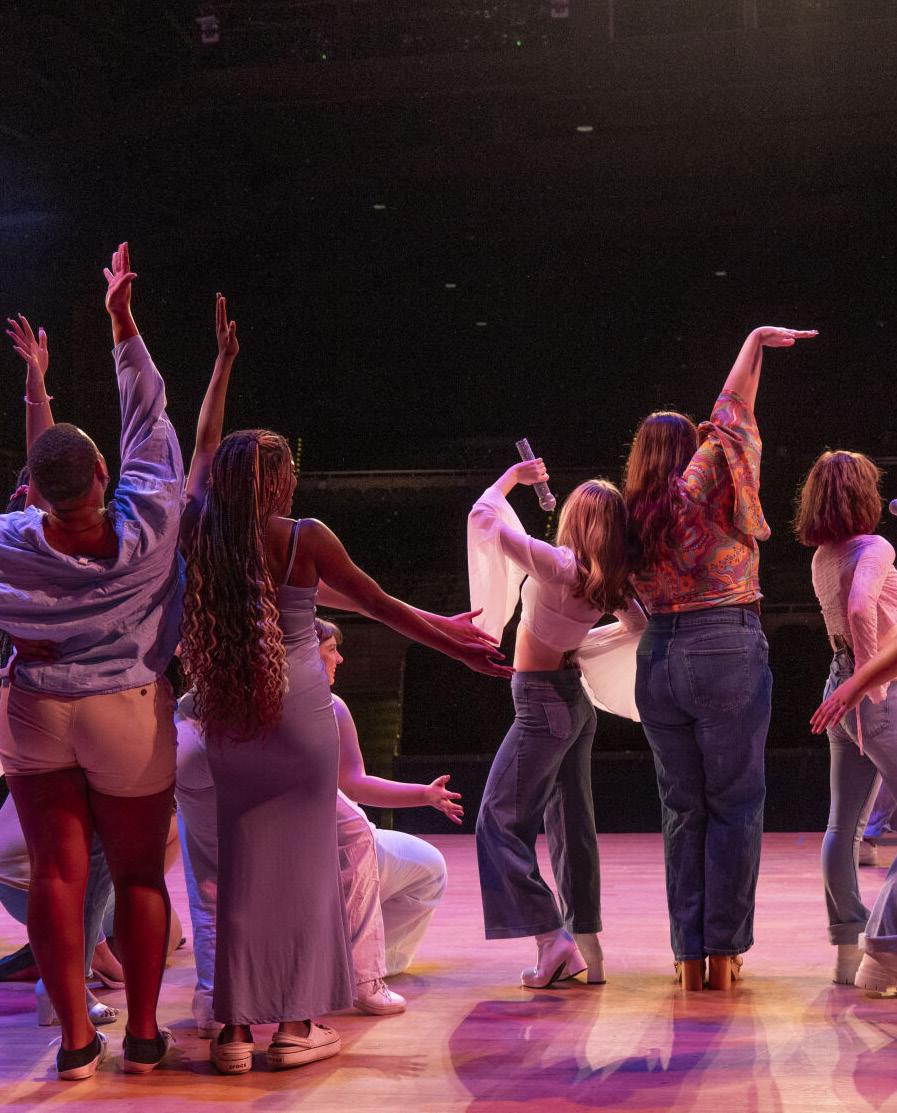





LSU engineering students competed to see who created the superior combat robot at the annual


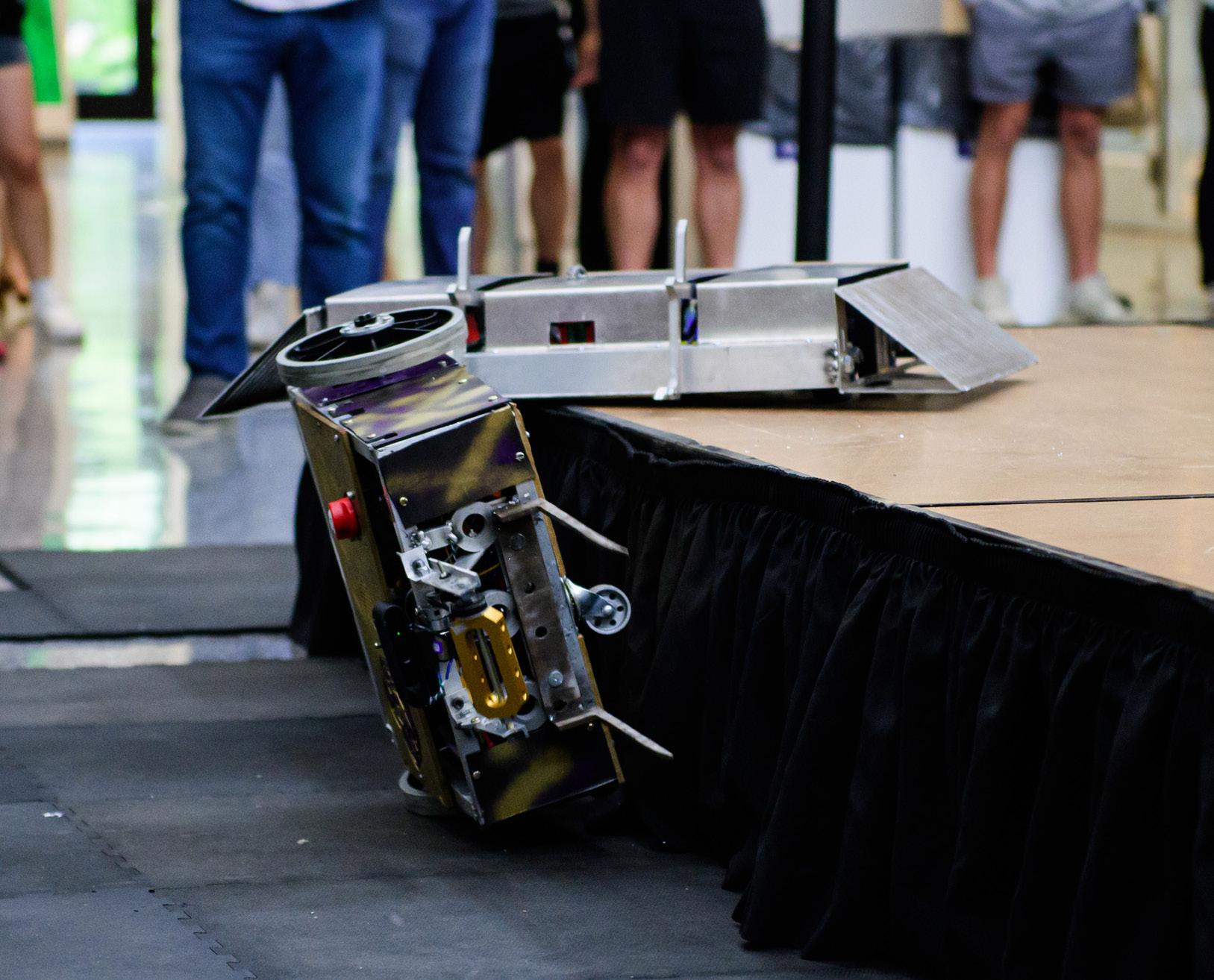

















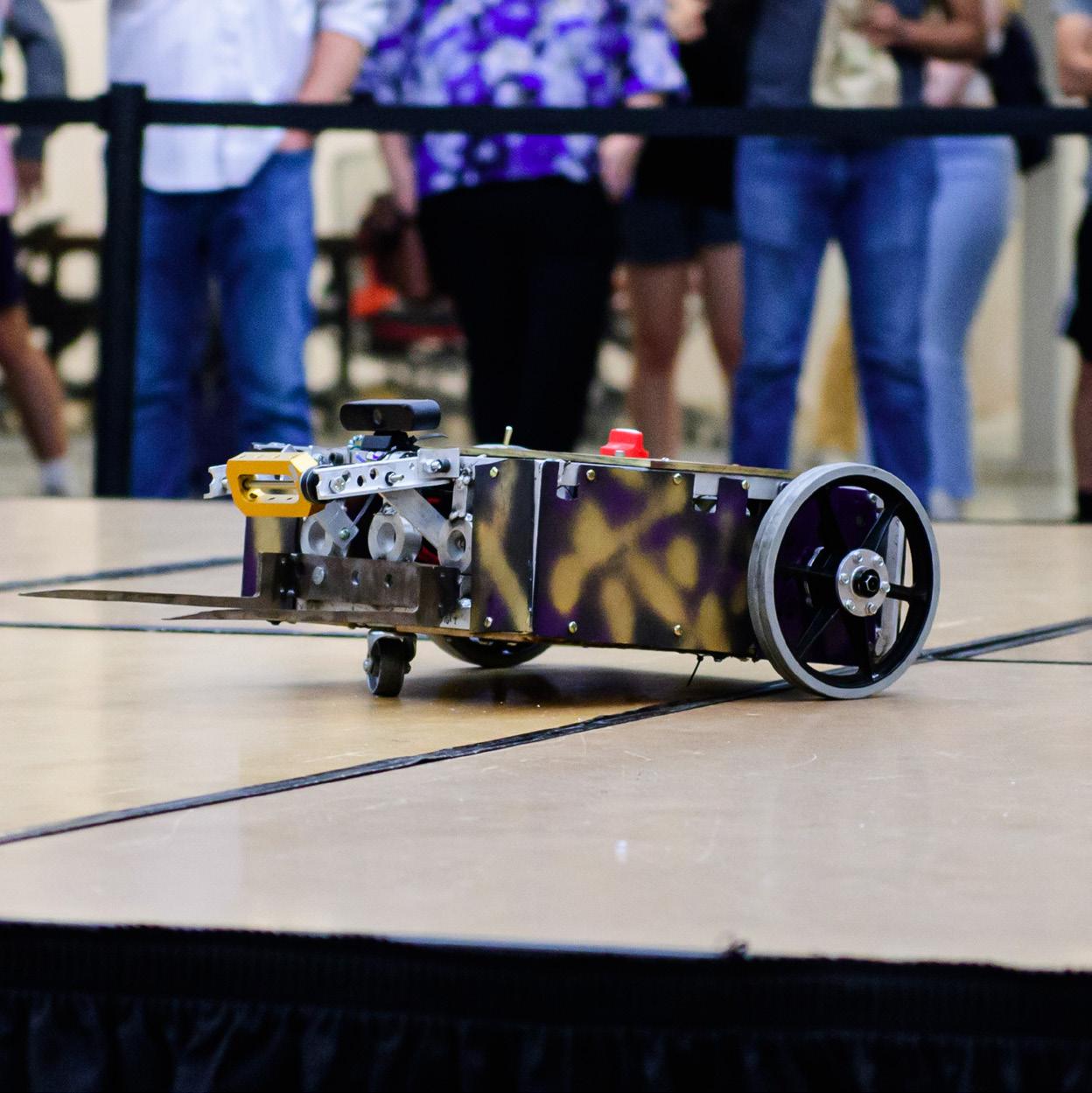








LSU softball defeated University of Louisiana at Lafayette 4-2 on Tuesday in Tiger Park.
The Ragin’ Cajuns traveled to Baton Rouge for the long-awaited rematch after they ended the Tigers’ season in the 2023 NCAA Regional.
Even though UL-Lafayette lost, the team was heavily supported by the large number of fans in red among the purple and gold.
“This game shows you softball is in a really great spot in Louisiana,” LSU head coach Beth Torina said. “So much talent and two really solid teams.”
In the all-time series, LSU leads UL-Lafayette 25-15. They have a historic in-state rivalry that guarantees a close game.
In the first inning when UL-Lafayette’s three-hole hitter crushed a two-run home run, it set the tone for another battle between the Louisiana teams.
LSU was in a 2-0 deficit, but shortstop Taylor Pleasants helped make a move toward coming back. She hit a single just shy of the left fielder to send McKenzie Redoutey home.
In the fourth inning, the Tigers doubled their lead.
Kelley Lynch walked on four consecutive balls, and Sierra Dan-

iel reached on an error. After Redoutey grounded out to second, Ciara Briggs hit a base clearing single to end UL-Lafayette pitcher Chloe Riassetto’s reign.
“Honestly I was just saying ‘see ball hit ball’ at that point,” Briggs said. “I saw the pitch I wanted to hit and went after it.”
Junior Sam Landry came in to finish the inning. Landry kept the Tigers from scoring for the remainder of the game.
Landry is the Ragin’ Cajuns’
La.
ace pitcher. She threw four strikeouts and no walks in two innings.
Contrary to the Ragin’ Cajuns, Berzon finished the game singlehandedly. She recorded three strikeouts and only allowed one free base.
“[My defense] allows me to be who I am as a pitcher,” Berzon said. “I pitched a lot of contact, but they allow me to play free.”
The Ragin’ Cajuns were coming into this game with a strong resume. They defeated No. 1 Okla-
homa earlier this season and only have one conference loss.
LSU, on the other hand, was coming off of a 2-1 series loss to Auburn.
“We just had a clean slate, and we just tried to be LSU softball and go big,” Briggs said. “Just stick to us and stick to our process, sticking to our game plan.”
With the win against UL-Lafayette, LSU has switched the momentum to its side before its upcoming series against Tennessee.
LSU baseball defeated the University of New Orleans in a hard-fought battle Monday night, winning 6-3 thanks to a handful of home runs from the veterans.
Thatcher Hurd started on the mound for the purple and gold, his first midweek start of the season. Unfortunately for Hurd, his outing didn’t go as planned.
The Privateers jumped out to an early start against the Tigers, scoring two runs in the first inning off a two-run home run from right fielder Mitchell Sanford.
UNO’s two-run homer was all the Privateers were able to grab off Hurd, but he retired for the night after two innings, recording one strikeout and two walks.
Sam Dutton replaced Hurd on the mound in the third inning, and his night started off rough with UNO hitting a solo home run from his first batter.
Fortunately for LSU, UNO’s third inning homer was its final run of the game. Javen Coleman, Christian Little, Justin Loer,
, page 10
Five plays into LSU football’s annual Spring Game, there was every indication that the Tigers were backtracking into the same mistakes, the same mental gaffes and the same missteps.
In the fall, LSU’s championship-caliber offense was held back by a defense that ranked among the country’s worst — one that continuously bent and broke.
The offseason was spent trying to fix that, with the defensive staff completely overhauled, but now it was happening again.
Thirteen yards to Aaron Anderson: wide open, with freshman cornerback PJ Woodland caught backpedaling way downfield on Anderson’s dig route.
Twelve yards as Josh Williams ran through the defense, overpowering tacklers. Ten yards to Mason Taylor. In between was a mercifully dropped deep ball where cornerback Ashton Stamps trailed receiver Chris Hilton Jr.
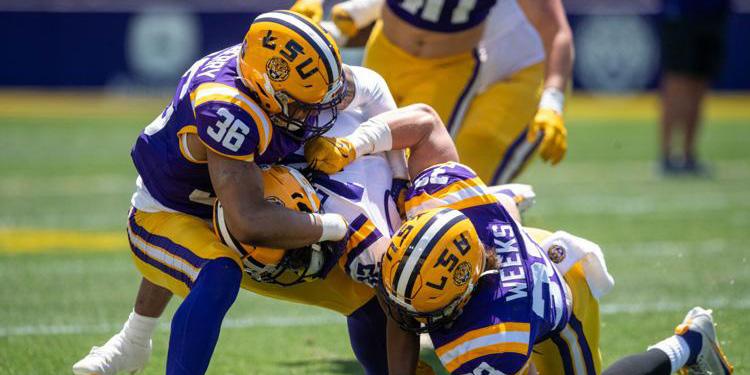
The secondary showed something it has been lacking: depth.
Several young players stood out and made plays on the second team. That will need to continue, as the defensive backs are the swing factor of LSU’s defense this season.
Signs of progress
It wasn’t a perfect day for the defense by any means, but the second-team players did their part.
In particular, Jackson, the redshirt freshman safety, was very physical at the point of the catch.
“His skillset is such that, you know, he’s going to do a really good job on the tight ends,” head coach Brian Kelly said. “We expect him to do that.”
Freshman safety Dashawn McBryde also made an impact with his great length and tackling ability.
The opening drive was capped off by a 45-yard touchdown to transfer wide receiver Zavion Thomas, complete with a celebratory round of duck, duck, goose for the offense.
the defensive backfield fought back.
The spotlight defensively was once again on the much-maligned secondary. Instead of crumbling,
On the next drive, the secondteam defense forced a punt, playing solid all around, highlighted by a physical Kylin Jackson pass breakup.
By the end of the game, the defense and the offense had tied, 31-31. The first-team defense took its lumps, allowing 21 of those points in their first three drives on the field, but there was something to build on.
Jyaire Brown, a transfer cornerback from Ohio State, also had a few plays where he had good position, including a pass breakup in the end zone and a
HOME RUNS, from page 9
Will Hellmers and Fidel Ulloa all pitched following Dutton, shutting out UNO for the night.
The infield was a highlight for the Tigers on defense, with Steven Milam, Michael Braswell III and Jared Jones linking up for multiple double plays to keep the Privateers at bay.
“You watch the work that guys like Braswell and Milam have been putting in this last couple of weeks, and it’s great to see it pay off,” Little said. “It’s
SPRING GAME, from page 9
third down tackle short of the sticks.
Though the second-team front seven generating pressure and the backup quarterbacks’ inaccuracy both helped, the secondary held its own.
It remains to be seen how big of a role the backup defensive backs will have this season, but many have made a case to be involved.
As for the first-team defense, there were certainly issues. On the 45-yard opening drive touchdown, Kelly said the defenders confusedly ran Cover 2 instead of Cover 3, leaving an entire third of the field uncovered, something he’d never seen before.
That was just one of three 40-
great to know when you handle your job, you have somebody behind you handling theirs.”
On offense, LSU’s success was led by its veterans’ plate performances.
Tommy White opened the scoring for the Tigers, hitting an RBI single to bring home Paxton Kling in the first inning.
Milam grabbed an RBI triple later in the game, and White followed with another RBI to put the Tigers in front for the first time in the fifth inning.
Half of LSU’s runs came from
yard gains it allowed through the air.
“We can’t have those kind of mistakes,” Kelly said. “They’re unacceptable … we just got flat out out-ran for the football.”
On another big play allowed by the first team, sophomore running back Kaleb Jackson burst free for an untouched 32-yard touchdown. Safeties Sage Ryan and Jardin Gilbert both took bad angles to the ball.
Clearly, some of the old habits resurfaced. But it wasn’t all bad for the starters.
Once Nussmeier came out of the game, the first-team defense played two more drives and forced two stops.
Woodland was the culprit on a few breakdowns, but he looked strong before the game in red
solo home runs, with Brady Neal, Hayden Travinski and Jones all sending shots over the fence to cap off the team’s win at home.
Jones’ home run marked his 15th of the season, leading the Tigers in home runs. Travinski isn’t far behind though, with his homer tonight bringing him to double digits at 10.
Another midweek win for the Tigers gives them some momentum heading into the weekend, and the team feels their season is far from over.
“I’m catching and I look into
zone drills. He came up with multiple pass breakups.
There’s absolutely plenty of room to improve for the defense, but there were flashes from the secondary. It seemed like last year a play where a defender was in a good position as the ball flew through the air was a rarity, and there were several examples of that Saturday. Where it stands now
Though many have speculated that LSU may seek to replenish the defensive back room with the spring transfer portal window beginning April 16, Kelly seemed to indicate that the only position the team will address there is defensive tackle.
That means that what the team has is what it has.
Kelly frequently said the same
the bullpen, and we got Fidel [Ulloa] and Christian [Little] and I’m like, we can beat anybody. Those are legit pitchers. The talent, and what I’ve seen in the fall, I know everyone on this team is capable of incredible things,” Neal said about the team’s confidence at this point in the season.
LSU takes the field again on Friday, traveling to Missouri for its sixth SEC series of the season. The Tigers are 3-12 in conference play, 3-8 in away games, and they have yet to win a Southeastern Conference series.
last year throughout the secondary’s struggles, that another cornerback wasn’t walking through the door. For all the changes to the coaching staff, there haven’t been any overwhelming changes to the defensive back room.
It seems likely that many of the current starters in the secondary (namely, Woodland and Stamps at cornerback, Gilbert and Ryan at safety and Major Burns at the star position) will be fighting for their spots into the fall. There’s likely to be shuffling, especially with young players performing so well.
Still, it may be the case that the personnel LSU has available once again, will hold it back. However, it’s also far too early to judge.
Throughout spring practices,
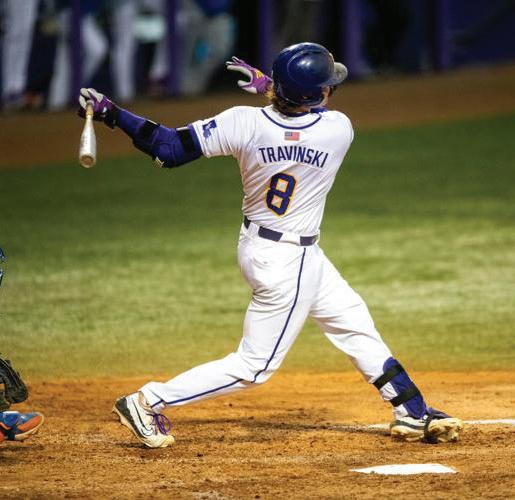
the new defensive staff has been building from the ground up with installing the defensive scheme. They’ve worked on basic things like gap alignment, and the emphasis has been on teaching and correcting.
Needless to say, the way the defense looked in the Spring Game isn’t what it’ll look like Week 1, or even in fall practices. The players are just getting accustomed and grasping the basics.
At the end of the day, depending on the staying power of what looks so far like another great offense, the defense doesn’t need to carry the team.
It just needs to do its part, something it often didn’t do last year, and something it’s working to do going forward.



NATHANIEL DELA PEÑA
@NateDerDoner
I know most of us can’t imagine life without chicken: It’s a cheap, lean meat that gives joy to every broke college student. You can make chicken fajitas, fried chicken, chicken tenders, chicken salad and chicken-fried steak.
Yet I’ve learned that there can only be one dish to rule over the rest. There’s always been that one chicken dish I look forward to. And I thought I knew what it was for a long time.
I’ve always loved fried chicken and its cousin, chicken tenders. My earliest and fondest memory was drenching my Jollibee, a Filipino fast food chain, fried chicken and rice with their signature gravy. All across the world, frying is a cheap, scrumptious way to prepare the meat.
Louisiana is undoubtedly
a leader in making great fried chicken, whether it’s Raising Cane’s Chicken Fingers, Popeyes Louisiana Kitchen or even the local mom-and-pop stores here.
Popeyes and Raising Cane’s have been popularized throughout the U.S., and both have a chance to expand into other countries. Popeyes even opened a location in the heart of the British Isles: London.
But I’m not sure that Popeyes and Raising Cane’s can ever compete with Nando’s, a chain restaurant originating in South Africa and widely popular in the U.K.
I recently tried Nando’s for the first time in London, and I must admit that I was wrong to assume that Popeyes and Canes alone would sustain my chicken needs.
I’ve eaten grilled chicken before, but never as the defining meal for a franchise. I’ve enjoyed local restaurants that make grilled chicken dishes, but I find them overpriced.
Yes, I know it’s wrong to
compare Nando’s grilled chicken with Popeyes’ or any other American chicken place, but it’s frustrating to be in a grilled chicken desert.
I’ve always enjoyed the crunch and juicy interior of fried chicken. I love dipping a Cane’s finger into that special Cane’s sauce. There’s a reason why both franchises are expanding throughout the globe. Their chicken is superb.
But for me, my desire to eat fried chicken comes and goes. Its greasiness forces my stomach to reconsider eating it every time I do.
And the health effects of eating fried chicken drive me away more often than not. Imagine the amount of sodium, preservatives and cholesterol. You may ignore the fact that it wreaks havoc on your health, but eventually, you’ll pay dearly for it.
Nando’s chicken offers a wonderful alternative. Although I initially saw Nando’s as strictly a British restaurant, I was surprised to find out it was a South African franchise.
The chicken is marinated peri-peri (a spicy pepper sauce) style, based on the Portuguese Galinha à Africana cooking method. The chicken I tried was marinated with lemon and herb, but I later regretted my decision. My greatest regret will be never trying Nando’s the real way: with the spicy peri-peri sauce that every Nando’s aficionado craves.
Apart from the peri-peristyle chicken, Nando’s is a jewel of a restaurant. I found the service simple and efficient. They sit you down at a table yet expect you to order your meal through a QR code. The waiters then bring your food once it’s ready.
I’m not saying the service in other restaurants is worse; it’s just that Nando’s service makes sense.
Taste-wise, it’s a tough choice to make, but in terms of guilt-free food, Nando’s has the edge over my beloved Cane’s and Popeyes. The child within me craves fried chicken, but the refined man longs for the
sophisticated taste of Nando’s grilled chicken with spicy rice.
Therefore, Nando’s should expand into the grilled chicken desert of the Deep South. Fried chicken franchises have reigned supreme here; it’s time for the grilled chicken crowd to take a good share of the Southern market.
Both fried chicken and periperi chicken have humble beginnings as dishes borne out of an exchange between Africans and Europeans.
Fried chicken in the U.S. came as a result of interaction between the Scottish who used frying as a method of cooking and African slaves who used a familiar blend of spices for their chicken. Peri-peri chicken came as a result of interaction between Portuguese colonists and their African counterparts.
Nando’s peri-peri chicken deserves a chance from us.
Nathaniel Dela Peña is a 21-year-old political science and history senior from Alexandria.

JEMIAH CLEMONS @Miclemah
Going to the bar and meeting a cute stranger is common.
Unfortunately, it’s even more common for women in these scenarios to become victims of the ongoing femicide in the U.S.
In an effort to combat this, women have started using fake names when going to bars and clubs to meet people. Fake names and other safety precautions are used to avoid predators in nightlife settings.
Typically, when a woman meets a man at a bar or club, there’s an exchange of names, social media handles and sometimes phone numbers. More times than not, women are uncomfortable in these situations and feel pressured to provide this information so that they aren’t harassed or assaulted. Once they reach safety, most women block the man’s number and socials.

What’s truly heinous about these acts of violence is the typical public reaction. Instead of blaming the attacker for his deplorable actions, people will find a way to fault the Spain twins.
Simply condemning the patriarchy would be easy and predictable, but there’s another approach that may be more helpful. Instead of holding women responsible for the safety of other women, men who genuinely have good intentions should also know how to intervene in these situations.
reluctant to intervene in interpersonal violence or domestic violence disputes. It’s also been reported that men’s willingness to step in is influenced by their perception of the victim.
Bystanders shouldn’t allow their biases to dictate whether they help someone. Intervening in these situations can protect women from a variety of dangers.
It’s a very convoluted process that doesn’t guarantee women’s safety, but it’s necessary. If it weren’t for the predatory behaviors of men, women wouldn’t have to go to these lengths. One could argue that women should just say “no” and decline sexual advances, but this leads to harassment, assault and even death in some cases.
with them. Both rejected his advances and the conversation escalated until the man stabbed them, according to reporting by The New York Times. This encounter left Samyia dead and Sanyia in the hospital.
Just this March, twin sisters Sanyia and Samyia Spain were brutally attacked in a New York deli by a man who was flirting
This is just one of the thousands of rejection killings that severely impact Black women more than any other race in the U.S., according to data analysis by the Violence Policy Center.
Men are notorious for not reading social cues even when the signs are right in front of them. Women only entertain very uncomfortable conversations with men if they feel in danger, and their body language says it all. So if a man sees this, he should feel more than obliged to step in.
Sometimes, people get so caught up in minding their business that other people’s well-being suffers as a result.
A 2017 study by the Journal of Interpersonal Violence demonstrated that men are more
Even if a woman isn’t in immediate physical danger, providing a fake name can help prevent cyber stalking. Most people can go on Instagram and find someone using only their first name. With harmful intentions, anyone could find anyone’s social media account, even if it’s private.
The next time you find yourself at a bar and you see a woman talking to a man, think twice about turning a blind eye to that encounter. Pay attention to body language, her drink and any other red flags. If you see something, say something.
Jemiah Clemons is a 20-yearold kinesiology sophomore from Miami, Florida.

We





